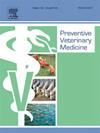Cannabidiol treatment for refractory idiopathic epilepsy in dogs: A systematic review with risk of bias assessment
IF 2.4
2区 农林科学
Q1 VETERINARY SCIENCES
引用次数: 0
Abstract
We conducted a systematic literature review of randomised controlled trials (RCTs) on the use of cannabidiol (CBD) as a supplementary treatment for refractory idiopathic epilepsy in dogs. The objective was to summarise the efficacy and adverse effects of CBD treatment and assess the potential risk of bias in conducted studies, including an assessment of the effects thereof on the evaluation of CBD for clinical use. Studies were included in the review if they were RCTs comparing groups of dogs with refractory idiopathic epilepsy treated with CBD oil or placebo oil, respectively. The outcomes had to be efficacy and adverse effects of the treatment. English-language reports of studies published in any year were considered. A total of three studies were included in the review. All studies suggested a reduction in seizure frequency during CBD treatment, and all observed ataxia as an adverse effect of CBD treatment or a reason for withdrawal from the studies. Additionally, studies found increased levels of serum alkaline phosphatase (ALP) in dogs treated with CBD. Adverse effects included vomiting and diarrhoea, changes in appetite, behavioural changes and somnolence. The studies were characterised by a moderate to high risk of bias, which affected their validity and reliability. Based on the existing literature, it is not possible to draw conclusions concerning the efficacy and potential adverse effects of CBD as a supplementary treatment for refractory idiopathic epilepsy in dogs, and more high-quality studies are needed to evaluate clinical efficacy, the optimal treatment dose and adverse effects.
大麻二酚治疗犬难治性特发性癫痫:一项带有偏倚风险评估的系统评价
我们对使用大麻二酚(CBD)辅助治疗犬难治性特发性癫痫的随机对照试验(RCTs)进行了系统的文献综述。目的是总结CBD治疗的疗效和不良反应,并评估已进行研究的潜在偏倚风险,包括评估其对CBD临床使用评估的影响。如果研究是随机对照试验,比较分别用CBD油或安慰剂油治疗的难治性特发性癫痫狗的组,则纳入本综述。结果必须是治疗的疗效和不良反应。任何年份发表的英文研究报告都被考虑在内。本综述共纳入了三项研究。所有的研究都表明CBD治疗期间癫痫发作频率降低,并且所有的研究都观察到共济失调是CBD治疗的不良反应或退出研究的原因。此外,研究发现,接受CBD治疗的狗血清碱性磷酸酶(ALP)水平升高。不良反应包括呕吐和腹泻、食欲改变、行为改变和嗜睡。这些研究的特点是有中度到高度的偏倚风险,这影响了它们的有效性和可靠性。基于现有文献,尚无法得出CBD作为犬难治性特发性癫痫补充治疗的疗效和潜在不良反应的结论,需要更多高质量的研究来评价临床疗效、最佳治疗剂量和不良反应。
本文章由计算机程序翻译,如有差异,请以英文原文为准。
求助全文
约1分钟内获得全文
求助全文
来源期刊

Preventive veterinary medicine
农林科学-兽医学
CiteScore
5.60
自引率
7.70%
发文量
184
审稿时长
3 months
期刊介绍:
Preventive Veterinary Medicine is one of the leading international resources for scientific reports on animal health programs and preventive veterinary medicine. The journal follows the guidelines for standardizing and strengthening the reporting of biomedical research which are available from the CONSORT, MOOSE, PRISMA, REFLECT, STARD, and STROBE statements. The journal focuses on:
Epidemiology of health events relevant to domestic and wild animals;
Economic impacts of epidemic and endemic animal and zoonotic diseases;
Latest methods and approaches in veterinary epidemiology;
Disease and infection control or eradication measures;
The "One Health" concept and the relationships between veterinary medicine, human health, animal-production systems, and the environment;
Development of new techniques in surveillance systems and diagnosis;
Evaluation and control of diseases in animal populations.
 求助内容:
求助内容: 应助结果提醒方式:
应助结果提醒方式:


